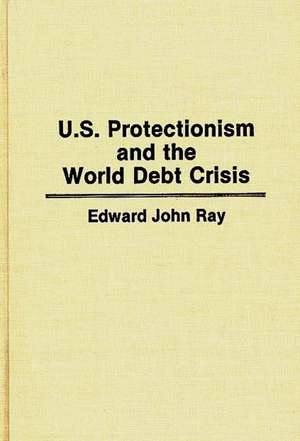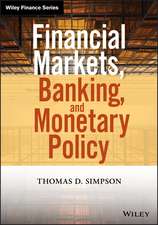U.S. Protectionism and the World Debt Crisis
Autor Edward J. Rayen Limba Engleză Hardback – 30 noi 1989
Ray presents a comprehensive review of U.S. trade policy since World War II, with particular emphasis on how that policy has affected developing countries. Special attention is given to trade policy shifts in the last twenty years in an attempt to determine whether or not U.S. trade concessions to developing countries contribute positively to their efforts to meet their considerable debt obligations. The author combines theoretical discussion with empirical data drawn from the seven leading debtor nations--Argentina, Brazil, Indonesia, Korea, Mexico, the Philippines, and Venezuela--in a provocative examination of the economic and sociopolitical causes and implications of changes in protectionism and the pattern of tariff and nontariff trade barriers in the last few decades.
Following an introductory analysis of the history of protectionism in the United States, Ray explores the role of the General Agreement on Tariffs and Trade (GATT) after World War II in eliminating protection and the impact on developing countries of the changes in tariffs and in the use of nontariff trade barriers under the auspices of GATT. Subsequent chapters deal with such issues as the reasons for the adoption of the Generalized System of Preferences (GSP) adopted in 1975, the relationship between U.S. trade policies since 1975 and the world debt crisis, the reasons behind the adoption of the Caribbean Basin Initiative in 1983, and the 1985 revision of the GSP. A separate empirical chapter assesses the effects of the new GSP legislation on exports to the United States from developing countries in general and from the severely indebted seven in particular. The final chapter is organized around three major themes: the future course of U.S. trade policy, the likely impact of the U.S.-Canada Free Trade Agreement on the United States and Canada, and the Uruguay Round negotiations and the implications of the Omnibus Trade and Competitiveness Act of 1988 on trade between the United States and the debtor nations. Students of international business, international politics, and economic development will find Ray's analysis of the relationship between trade protectionism and world debt an important contribution to current debates on the causes, effects, and solutions to the Third World debt crisis.
Preț: 439.17 lei
Preț vechi: 604.98 lei
-27% Nou
84.04€ • 87.21$ • 70.25£
Carte tipărită la comandă
Livrare economică 18 martie-01 aprilie
Specificații
ISBN-10: 0899303676
Pagini: 259
Dimensiuni: 166 x 242 x 25 mm
Greutate: 0.59 kg
Ediția:New.
Editura: Quorum Books
Descriere
Following an introductory analysis of the history of protectionism in the United States, Ray explores the role of the General Agreement on Tariffs and Trade (GATT) after World War II in eliminating protection and the impact on developing countries of the changes in tariffs and in the use of nontariff trade barriers under the auspices of GATT. Subsequent chapters deal with such issues as the reasons for the adoption of the Generalized System of Preferences (GSP) adopted in 1975, the relationship between U.S. trade policies since 1975 and the world debt crisis, the reasons behind the adoption of the Caribbean Basin Initiative in 1983, and the 1985 revision of the GSP. A separate empirical chapter assesses the effects of the new GSP legislation on exports to the United States from developing countries in general and from the severely indebted seven in particular. The final chapter is organized around three major themes: the future course of U.S. trade policy, the likely impact of the U.S.-Canada Free Trade Agreement on the United States and Canada, and the Uruguay Round negotiations and the implications of the Omnibus Trade and Competitiveness Act of 1988 on trade between the United States and the debtor nations. Students of international business, international politics, and economic development will find Ray's analysis of the relationship between trade protectionism and world debt an important contribution to current debates on the causes, effects, and solutions to the Third World debt crisis.











